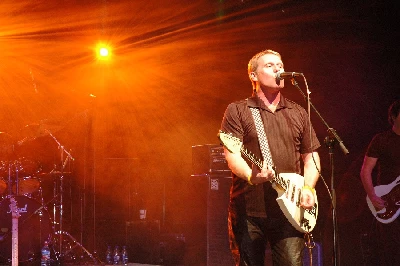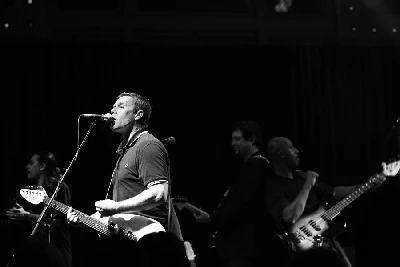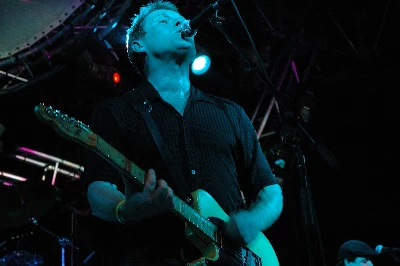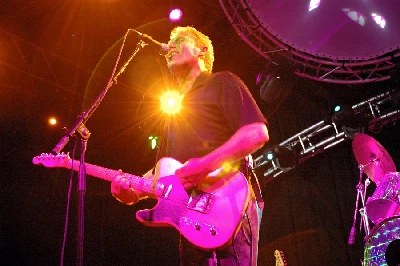Beat
-
Interview with Dave Wakeling
published: 26 /
5 /
2023
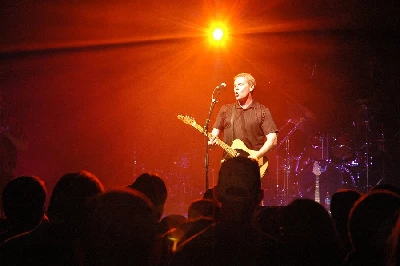
Frontman Dave Wakeling talks to Eoghan Lyng about The Beat's political as well as his musical influences and his group's forthcoming British tour.
Article
"It was a great honour to see 'Stand Down Margaret' played in ‘The Crown.’" chuckles Dave Wakeling. "For one, it was nice to live long enough to see it, and also the episode showed Thatcher in a clearer light. I was surprised to see it played at the end of the episode, because they normally play the theme from ‘The Crown’ at the end. I was delighted."
As well he should. What was once considered a rakish commentary about a prime minister transforming her country from subpar into superpower is now rightly considered a biting sound painting that captured the politician at her most self-interested and volatile. "The BBC learned their lesson," Wakeling explains.
"They banned The Sex Pistols, which then went up to number one on the charts. So, they wouldn't ban you, but tried to suffocate you by not playing you.” ‘There haven't been any requests for the track.' “Yeah, because they weren't playing it. They did play the other side, 'Best Friend' quite a lot, so it did make it into the charts. I wrote most of the lyrics for 'Stand Down Margaret', but Andy Cox wrote the line 'how can it work in this all white law,' which had two meanings. It had the obvious one, but it was also a reference to Geoffrey Howe and William Whitelaw, who were on her cabinet. I can't remember what they did, but it was a great line."
PennyBlack readers will recognise Wakeling for his work with The Beat, although he did enjoy some chart success as co-frontman of General Public. He quotes from 'Tenderness' , a probing pop piece that features the stark lyric: ‘Words like conviction can turn into a sentence.’
"It just goes to show that if you believe in everything you're trying to say, you could well end up with a real life conviction," he says. Lyrics, he feels, are an integral part of the songwriting process. "Dexys and Kevin Rowland had a lot of good lyrics, but they weren't easy to understand at first. It was only after reading them that you understood what it was he was trying to say. They could be overwrought and didn't have a lot of time for many other bands, but I quite liked what they did. I think some of his more recent songs have been clearer."
Wakeling says it's much more challenging to write something direct than a lyric that might be described as "clever." He enjoyed David Bowie's approach to songwriting, suggesting that The Thin White Duke had an approach that was similar in style to William Burroughs.
"David would cut things up, piecing them together," Wakeling recalls. "It was very similar to what Burroughs did. Growing up, I was more of a Stones’ fan than a Beatles’ one. Privately, I enjoyed both, but because of my admiration of Brian Jones' guitar playing, I had to publicly say I preferred them. They were more of the 'piss anywhere we want', but in reality they were more like University guys while The Beatles were the working class heroes!"
Nevertheless, Wakeling holds a candle for 'Ruby Tuesday', a ballad that helped fuel his love for music. "It came on the radio after 'Walk Away Renée', and after listening to the two songs, I felt very emotional…” He stops himself and states: "I still feel like that when I hear those two songs. I was about thirteen or fourteen."
Singer-songwriter Robyn Hitchcock said something similar to me when I interviewed him - fourteen seems to be a transformative age for musicians. "Well, it's puberty," Wakeling reasons. "People are always like that with the music they grew up listening to. Teenagers today will tell you that the music they listen to is the best ever. I guess it's also the age where your body might respond to music."
He giggles once more, recalling the poses he held as a youth, practising on a cricket bat. "I would pretend I was Brian Jones, I'd do it whenever my mother went out, and would practise in front of the mirror."
Noticing my Irish accent, Wakeling confirms that his mother came from hibernal stock.
"She was a Geordie, but she was a Quinn. And she knew she was a 'Quinn from Roscommon'. She and my dad had very different views on The Troubles. My mother was a proud republican, although she didn't agree with the violence, whereas my dad thought they should drop an atom bomb on Dublin as a warning."
Wakeling clearly disagrees with his father on that one, but reasons that his father - an RAF man - was only speaking his personal truth. "It was one of my first embarrassing conversations with my dad, because he wanted to sign me up. I thought, 'I can do the wearing the scarf and wave at the birds, but I can't do the 'fly-over and kill those women and children'. He said, 'They don't really do that anymore.' Well, compared to Dresden.."
Inevitably, Wakeling declined the opportunity ("I told an uncle of mine, I'd rather save people,") and welcomed music into his life. It proved a tasty alternative to swimming. "I still play a Vox Mark III," Wakeling says. "It was the guitar Brian Jones and Keith Richards played."
Brian May too. "Did he? Well, I'd need a six pence to play like him. I saw Queen play ten shows, so I saw him use the sixpence.”
Wakeling, who lives in the U.S., is preparing himself to play some shows on British soil in late May and in June. "But we won't be coming to Ireland, unfortunately." Due to Brexit restrictions, it cost them a small fortune to perform in Belfast and Dublin in 2022. He's clearly bothered by Brexit. "You know how the English are - that's part of the reason why I got out!"
He's happy to play to nostalgia, but there's a certain sadness as he reflects on all those who have left before him. "All the black guys are gone from The Beat," he sighs. Wakeling focuses on living in the moment, which is a philosophy he brings to his shows. "You do return to an almost child-like state when you're onstage. At the beginning, you put that on, but eventually it becomes, 'Look how pretty that light is.'"
Can we expect some new songs? "Since Covid, I've become a lazy sod," he admits, that cheeky grin slapped across his face. "I mean, we might release some new songs. But I don't think fans are really that interested. You play more than three, and they get a bit, 'Alright, can you go back to the songs we enjoyed when we were teenagers.' So, I'm writing songs for myself, which is the ultimate conceit, isn't it? I'm writing songs for myself. It's like the brandy you have under the bed, eh?'
Band Links:-
http://englishbeat.net/
https://www.facebook.com/EnglishBeatFa
https://twitter.com/theenglishbeat
Play in YouTube:-
Picture Gallery:-
